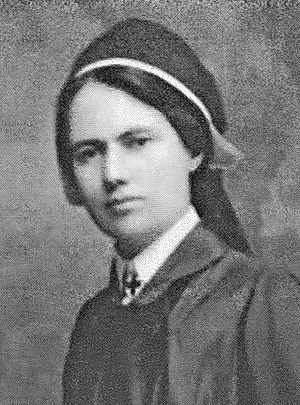Angela Boškin facts for kids
Quick facts for kids
Angela Boškin
|
|
|---|---|

ca. 1914 at her graduation
|
|
| Born | 21 May 1885 Piuma, Princely County of Gorizia and Gradisca, Austria-Hungary
|
| Died | 28 July 1977 (aged 92) Piuma, Gorizia
|
| Occupation | nurse |
| Years active | 1914-1944 |
| Known for | first professionally trained Slovenian nurse |
Angela Boškin (born May 21, 1885 – died July 28, 1977) was a very important nurse from Slovenia. She was the first person from Slovenia to be professionally trained as a nurse. She also worked as a social worker in the country that would become Yugoslavia.
Angela trained as a nurse in Austria. During World War I, she worked as a military nurse. After the war, she moved to the new country called the Kingdom of Serbs, Croats and Slovenes. There, she became the first public health nurse. She created special programs to teach new mothers about childcare. Her work helped to lower the number of babies who died. Angela also started the first nursing association in Slovenia and was its leader.
Early Life and Training
Angela Boškin was born on May 21, 1885. Her hometown was Piuma, which was part of a large empire called Austria-Hungary. Her father was a blacksmith. He had nine children, and it was hard to find enough work to feed them all.
After finishing primary school in Piuma, Angela was 20 years old. She went to Vienna to help her older brother. She kept house for him and helped in his shop. After seven years, she decided she wanted her own career. In 1912, Angela started nursing school. She did her hands-on training at a clinic run by Ernst Wertheim. She finished her training and graduated in 1914.
A Career Helping Others
After graduating, Angela Boškin became an assistant. She worked with a senior doctor who specialized in women's health. She helped with care for mothers and babies. But then, World War I began.
Angela was first sent to a military hospital. Later, she worked with a medical team from the Swedish International Red Cross. By 1917, she became the head nurse at the military hospital. She kept studying and learned more about social and health work in Vienna. She planned to work in Trieste.
However, after the war, the Austria-Hungary empire broke apart. People from Slovenia and Croatia who lived in Austria had to move. Their permits to live and work there were no longer valid. So, Angela was sent to the new country called the Kingdom of Serbs, Croats and Slovenes.
At first, she couldn't find a job. But in 1919, she agreed to go to Jesenice. This area was very poor. Angela mostly worked as a home-care nurse. She gave advice to mothers about how to care for their children. She quickly realized that people knew very little about hygiene. So, Angela started giving talks. She taught about basic cleanliness, childcare, how to prevent infections, and good nutrition.
Angela began nursing at a workers' center. She was the first social welfare nurse in the new country. In 1921, she started the first Advice Center for Mothers and Babies. She focused on helping mothers stay healthy and caring for infants. She gave new mothers baskets with hygiene items and basic bed linens.
Her work caught the attention of a famous children's doctor, Matija Ambrožič. He invited Angela to move to Ljubljana in 1922. She helped at an orphanage there. The next year, she started working at an institute for protecting girls. She gave lectures on home nursing services. This was the first training program for care nurses in the country.
In 1927, Angela founded the first professional group for nurses in Ljubljana. It was first called the "Organization of Graduating Nursing School Students." Later, it was renamed the "Ljubljana Organization of Graduate Nurses." Angela was chosen as its president. When the country became Yugoslavia in 1929, the group changed its name again. It became the "Association of Yugoslav Nurses."
Angela was then moved to Trbovlje, a mining town. Many babies there were dying; about one-third of all babies died within four days. The area had a lot of poverty, and many people couldn't read or write. There were also many abandoned children. Angela worked there just as she had before. She set up an advice center. She taught basic care and hygiene. Her efforts helped to lower the number of babies who died.
In 1939, she returned to Ljubljana. She started giving traveling exhibitions about hygiene for the Hygiene Institute. At the same time, she worked in Škofja Loka. She helped at a health center for mothers and children. She also worked with the anti-tuberculosis service. Angela retired in 1944. She went back to her hometown to live with her sister.
Awards and Legacy
In 1969, Angela Boškin received a special award called the Order of Merits for the People. Later, she was given the Gold Medal from the Nurses and Midwives Association of Slovenia. Angela Boškin passed away on July 28, 1977, in Piuma.
Today, Angela Boškin is honored with "Angela Boškin Day." This day is held every year in Jesenice. The Jesenice General Hospital and the College of Nursing celebrate her work. A documentary film was also made about Angela Boškin and shown in 2008.
 | John T. Biggers |
 | Thomas Blackshear |
 | Mark Bradford |
 | Beverly Buchanan |

